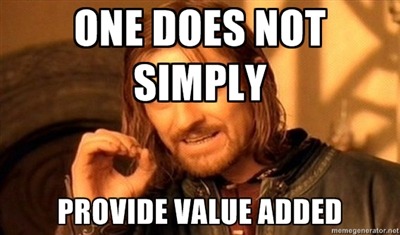 |
by Kent Aitken |      |
I fought the temptation to dig into the topic of faceless bureaucrats (see: Can Bureaucrats Be Interesting When The World Demands That They Be Boring? and The Problem Of The Faceless Bureaucrat), but I don't think CPSRenewal.ca needs to head straight for the singularity quite yet. Instead, I tried to answer a question I've been asking myself lately: Why does the idea of collaboration hold so much sway for me?
Overhyped Old News
I look forward to the day when we once again use the word collaboration to simply mean that we're working with others on something. Stripped of baggage and connotations of tech trends, paradigm shifts, and buzzwordiness. Collaboration is overhyped, and nothing new. But don't get me wrong. It is also an increasingly crucial driver of value creation.
Overhyped is an oversimplification; more so, collaboration is asymmetrically hyped. By that, I mean that there are far too many instances of collaboration being hyped without commitment. Overappreciated, on the other hand? It is not. By a long shot. We can use more hype, but only when there's meaning waiting behind it.
And it is nothing new. I need not dwell on this, but collaboration has been an effective approach to problem-solving since before our ancestors were recognizably human. More recently (relatively speaking), the capture of ideas through language and art allowed intertemporal collaboration: the ability, essentially, to collaborate with brilliant ghosts and build on their work.
Some of the drivers of collaboration's current celebrity are opportunity and clarity on complexity. And government has quirks that make it even more important.
Opportunity
We have far more avenues, platforms, and options for collaboration now, and the reach is literally beyond world-wide. In principle, this is also old news. The Oxford English Dictionary, for instance, was partially crowdsourced by mail in the mid-1800s. In practice, however, the opportunities for collaboration represent a radical change. I think the most amazing thing about effective collaborative platforms is often not the mechanism for collaboration, but rather the mechanism for finding others who are interested in the same thing. It's easier to get past our natural incredulity: “I can't imagine how I can contribute to X,” or, “I can't imagine who'd be interested in Y.”
Without search, it would take forever for someone to find enough other Ottawa fountain pen enthusiasts* to develop a society.
Complexity
We're faced with increasing complexity, and increasing clarity on the complexity that has always existed. I'm bothering to muddy this point by adding clarity because I think it is important. It's comparable to the history of astronomy – the night sky changed little, but our advancing telescope technology continuously revealed greater and greater mysteries. I wonder what we'll think of our current lens on the complexity of the world when we look back in a few decades.
But it's not just that our focus has sharpened. I think the statement "the world is getting more complex" passes muster as well.
Many wicked problems we face are unsolvable by individuals. Gerry McGovern's take is that “the more complex the world becomes the less we can depend on individual experts”, citing how recent economic events blindsided economists and other spectators. It's not because two heads are better than one, but because two very different heads are much better than one. Business writers and leaders are looking at diversity as a competitive advantage, and this idea clicks with some really interesting research on creativity that suggests that teams that are a mix of new and familiar faces develop more creative output. Or, consider that companies whose Board of Directors includes women outperform those that do not. By 26 percent over six years. Lastly, consider Philip Tetlock's groundbreaking research on expert predictions:
“Classifying thinking styles using Isaiah Berlin's prototypes of the fox and the hedgehog, Tetlock contends that the fox--the thinker who knows many little things, draws from an eclectic array of traditions, and is better able to improvise in response to changing events--is more successful in predicting the future than the hedgehog, who knows one big thing, toils devotedly within one tradition, and imposes formulaic solutions on ill-defined problems.”
A fox could be a fox because they, themselves, are a jack-of-all-trades. Or, they could arrive at their conclusions through collaboration.
And, Just To Twist The Knife
Amidst the above transitions, we've opted to make it even harder on ourselves, as government officials are moving from being service providers to relationship managers. In policy, we're increasingly engaging stakeholders, industry, and think tanks. For operations, we're turning to the private sector wherever possible. More and more, we'll be relying on collaborating with non-governmental actors, and on our governmental colleagues to help us do it**.
So back to the premise I left hanging: Collaboration is, and always has been, a crucial driver of value creation. But the current attention is not collaboration's fifteen minutes of fame. It's a big deal - for good reason - and getting bigger.
* I like fountain pens, but I just don't want to ever be referred to as a "fountain pen enthusiast." I hope they call me "a guy who likes fountain pens." And everyone should. They're easier on the hand, better for writing, create less waste, and are likely cheaper in the long run***.
** I'm glossing over this point. If you read my old blog, you know that I do this. I'm sorry, but this post is getting long, but it means that I'll likely return to this idea later.
*** The Ottawa Fountain Pen Society website is an excellent resource on where to buy fountain pens in Ottawa.


No comments:
Post a Comment